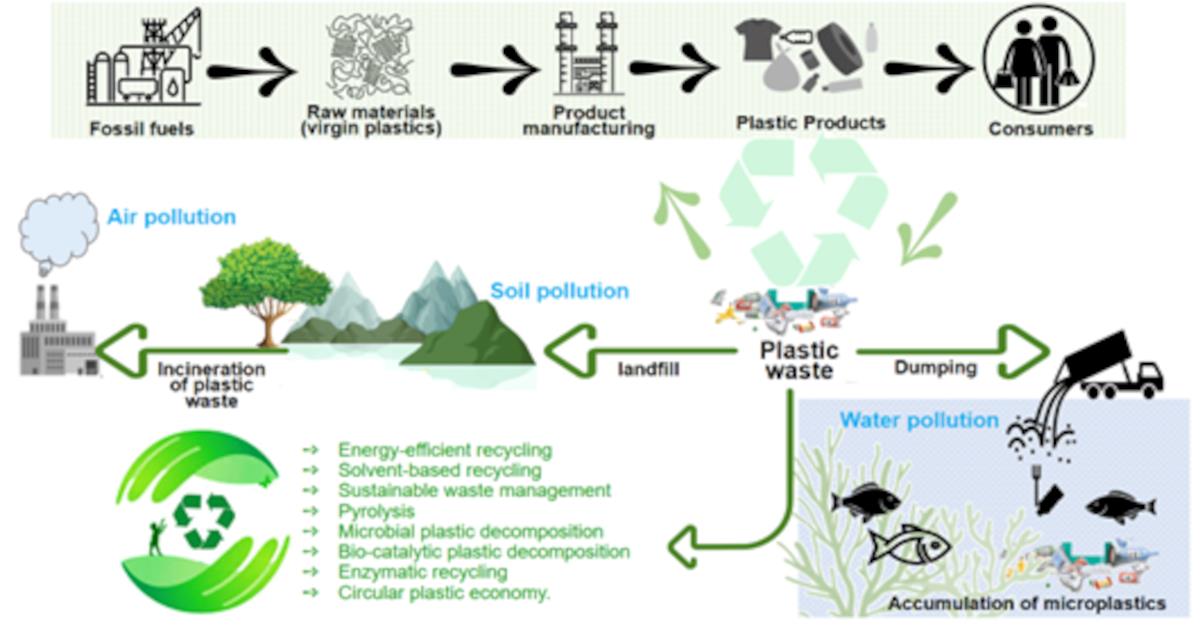Cutting-Edge Approaches for the Plastic Recycling
A special issue of Processes (ISSN 2227-9717). This special issue belongs to the section "Chemical Processes and Systems".
Deadline for manuscript submissions: 15 March 2026 | Viewed by 385

Special Issue Editors
Interests: plastic recycling; small molecules synthesis; polymer synthesis; smart and functional coatings; bio-based materials for packaging applications; PFAS remediation
Special Issues, Collections and Topics in MDPI journals
Interests: hydrogels; 3d printing; elastocaloric polymers; energy conversion
Special Issues, Collections and Topics in MDPI journals
Special Issue Information
Dear Colleagues,
According to a recent published reports, the world is producing approximate 57 million tons of plastic pollution annually, spreading it from the depths of the ocean to mountaintops and even inside human bodies. The surge in plastic use, the shift toward single-use plastics (one time use), and improper disposal methods have led to a devastating buildup of plastic waste in natural environments. It is also estimated that plastic-made materials take between 20 and 500 years to decompose. Hence, plastic pollution damages ecosystems and reduces biodiversity. These negative impacts of plastic-related materials have drawn significant attention from researchers, media, and government institutions, encouraging initiatives and policies aimed to reduce plastic waste. In this perspective, our focus is to investigate the factors driving plastic pollution and evaluate their impacts.
This Special Issue on “Cutting-Edge Approaches for the Plastic Recycling” looks for high-quality research as well as review articles focusing on recent advancements and innovations in plastic recycling. We also invite research contributions on emerging technologies such as depolymerization, pyrolysis, enzymatic and catalytic recycling, and hybrid methods (combination of mechanical and chemical approaches). Unlike conventional recycling, these advanced techniques break down plastics into their molecular or basic monomers, allowing for the recovery of high-quality materials (upcycling) that can be reused for a range of applications.
The topics within the scope of the issue include, but are not limited to, the following:
- chemical methods of recycling and upcycling;
- energy-efficient recycling;
- advanced solvent-based recycling;
- synergies for sustainable waste management;
- pyrolysis (thermal and catalytic processes)
- turning end-of-life plastics into new feedstock;
- microbial and bio-catalytic approaches for sustainable plastic decomposition;
- innovations in enzymatic recycling;
- economic viability, scalability, and environmental impacts of advanced recycling methods to build a sustainable and circular plastic economy.
Dr. Ajmir Khan
Dr. Zhaohan Yu
Dr. Shehla Mushtaq
Guest Editors
Manuscript Submission Information
Manuscripts should be submitted online at www.mdpi.com by registering and logging in to this website. Once you are registered, click here to go to the submission form. Manuscripts can be submitted until the deadline. All submissions that pass pre-check are peer-reviewed. Accepted papers will be published continuously in the journal (as soon as accepted) and will be listed together on the special issue website. Research articles, review articles as well as short communications are invited. For planned papers, a title and short abstract (about 250 words) can be sent to the Editorial Office for assessment.
Submitted manuscripts should not have been published previously, nor be under consideration for publication elsewhere (except conference proceedings papers). All manuscripts are thoroughly refereed through a single-blind peer-review process. A guide for authors and other relevant information for submission of manuscripts is available on the Instructions for Authors page. Processes is an international peer-reviewed open access monthly journal published by MDPI.
Please visit the Instructions for Authors page before submitting a manuscript. The Article Processing Charge (APC) for publication in this open access journal is 2400 CHF (Swiss Francs). Submitted papers should be well formatted and use good English. Authors may use MDPI's English editing service prior to publication or during author revisions.
Keywords
- energy efficient
- plastic pollution
- pyrolysis
- thermal recycling
- chemical and mechanical recycling
- downcycling and upcycling
- waste management
- pyrolysis
- depolymerization
- circular plastic economy
Benefits of Publishing in a Special Issue
- Ease of navigation: Grouping papers by topic helps scholars navigate broad scope journals more efficiently.
- Greater discoverability: Special Issues support the reach and impact of scientific research. Articles in Special Issues are more discoverable and cited more frequently.
- Expansion of research network: Special Issues facilitate connections among authors, fostering scientific collaborations.
- External promotion: Articles in Special Issues are often promoted through the journal's social media, increasing their visibility.
- Reprint: MDPI Books provides the opportunity to republish successful Special Issues in book format, both online and in print.
Further information on MDPI's Special Issue policies can be found here.







